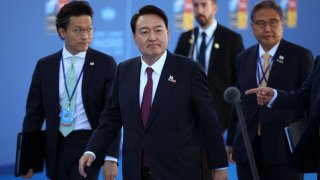Yoon's Failed Coup Already Has Serious Implications for South Korea's Security Partnerships
Now former President of South Korea, Yoon Suk-yeol, staged a coup just before the end of 2024. The result? It was over before it started, however, the short-lived coup rocked Korean politics to its core, and the ripple effects are still felt to this day.
President Yoon Suk-yeol’s shocking coup attempt through martial law has triggered an unprecedented and historic political crisis in South Korea. For this, Yoon and Prime Minister Han Duck-soo were impeached, the latter for refusing to appoint justices to vacant seats in the Constitutional Court that would rule on Yoon’s removal from office while acting President.
In this time of transition, Finance Minister Choi Sang-mok has assumed the duties of acting President. Unlike Han, he is likely to stay in office for the time being as he has confirmed his support for appointing justices to the Constitutional Court.
What has been less visible amid the ongoing crisis is how the failed coup has already had tangible negative ramifications for South Korea’s military readiness. This issue is compounded by the potential erosion of South Korea's role in its recently strengthened partnerships, such as its involvement in Pillar II of AUKUS and the United States-South Korea-Japan Camp David Entente, partnerships that are increasingly critical to the country’s national security.
Even if South Korea overcomes its current political instability, the opposition Democratic Party of Korea (DPK) is likely to the presidency in the next election. Despite the DPK’s strong support of the U.S.-South Korean alliance, it has expressed skepticism about pursuing stronger relations with AUKUS and Japan.
Although not a full member of AUKUS, South Korea has explored avenues for cooperation under Pillar II of the alliance, particularly for innovation in domains like defense technology and cybersecurity. Yet, the DPK opposes South Korea’s participation in initiatives under AUKUS Pillar II, arguing that it may provoke China into a more aggressive stance against South Korea.
The Camp David Entente that Yoon championed also hangs in the balance, even though acting President Choi has affirmed that his administration will continue to pursue stronger trilateral relations. Paradoxically, mere weeks before Yoon’s coup attempt, the Entente took a concrete step to formalize some of its structures by establishing a secretariat.
However, like with AUKUS, Yoon’s emphasis on closer ties with Japan drew criticism from the DPK and various other segments of the public, who have argued that this priority was effectively capitulating to a historical adversary. These factions similarly oppose the strengthening of Japan’s Self-Defense Forces, including permitting it to be stationed in allied territories like Guam.
All these factors may reduce South Korea’s continued participation in the Entente.
Perhaps above all though, this crisis diminishes South Korea’s image as a stable democracy and a reliable alliance partner. Just a year ago, South Korea hosted one of the regional Summits for Democracy. Now, Yoon’s coup attempt has triggered South Korea’s worst political crisis in its current democratic era, weakening the very norms that underpin its participation in the U.S.-South Korea alliance, AUKUS, and the Camp David Entente.
On top of all these developments, South Korea’s political crisis now provides a possible opening for its adversaries. China, already wary of South Korea’s growing alignment with the U.S. pivot to Asia, could intensify diplomatic and economic pressure on the next presidential administration.
Whereas such pressure would likely fail to coerce South Korea into terminating its alliance with the United States, South Korea may depart from the Entente and stop pursuing ties with AUKUS Pillar II, which would still be disruptive to relations.
Meanwhile, North Korea may seize on the instability, escalating provocations to test the resolve of South Korea’s interim leadership and its allies. The removal of South Korean military officers implicated in the failed coup has already strained South Korean military readiness, and Choi’s ability to navigate international crises remains untested. This scenario is especially threatening given that North Korea has openly stated that it now views South Korea as a “hostile foreign enemy” and bolstered its support for adversarial regimes like those in Russia and Iran.
Regardless, Choi’s interim leadership may buy time for South Korea’s support for trilateral organizations, even as his immediate priority is to restore public confidence in the government and lead the country through a tense and polarized political environment. Conversely, as acting President, Choi has little room to institutionalize such cooperation. This will hamper South Korea’s capacity for strategic innovation at a critical moment for its security.
Ironically, Yoon’s coup attempt, which was officially meant to protect South Korea from “North Korean communist forces” and “anti-state forces,” has instead plunged it into a deep crisis and weakened its participation in alliance and security partnership structures.
While the interim presidency of Choi Sang-mok offers some continuity from Yoon’s foreign policy, the long-term prospects with the United States and Japan look worrying. One thing is for certain though: as the Indo-Pacific region faces mounting challenges, from China’s assertiveness to North Korea’s provocations, South Korea’s ability to overcome this crisis will shape its alliances and regional influence for years to come.
Francis Shin is an author and research analyst focused on global governance, democratic resilience, and grand strategy. His expertise spans anti-corruption regulations, clean energy policy, and alliance structures. He has held roles at various prominent think tanks around the world, including the Atlantic Council, the Royal United Services Institute, and the Center for a New American Security.
Image Credit: Shutterstock.

